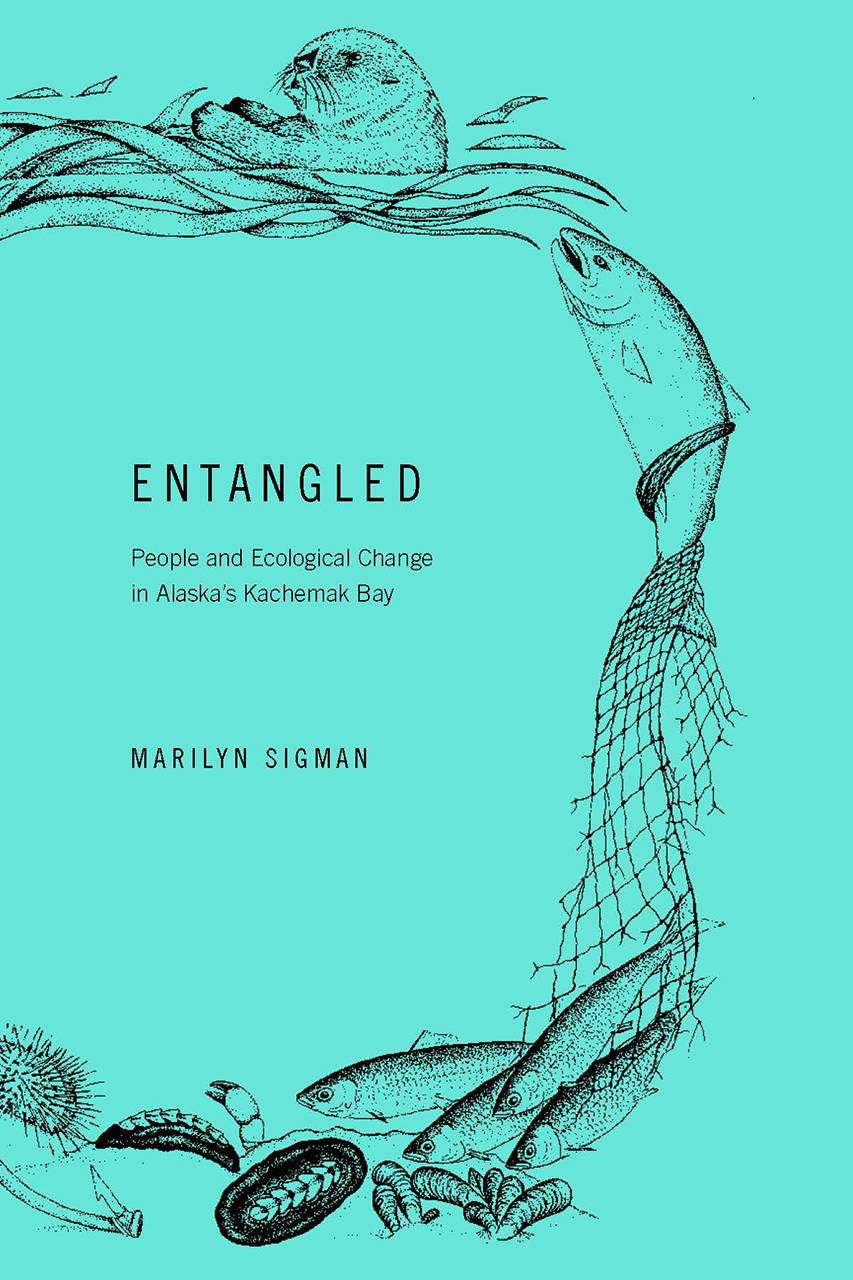“I walked the beaches, attuning my meanderings to the tidal cycles. The rocks lurking beneath the water were exposed by the ebbing tides, and they teemed with life in glistening swaths. The many-legged and shelled creatures clung to their crevices and the last drops of moisture until the tide returned. I walked the forest trails when the plant emerged, green-legged and the flowers shifted from violets in spring to a panoply of blossoms during the summer and later as bursts of red and yellow marked their dying back under the spruce trees.”
— Marilyn Sigman
During her eleven years working as a naturalist guide at the Center for Alaska Coastal Studies in Homer, author Marilyn Sigman started looking deeper into what was going on around her.
“I became really concerned about climate change and how it was changing a place I was really attached too — Kachemak Bay,” Sigman said.
This affection and worry spurred Sigman to write “Entangled: People and Ecological Change in Alaska’s Kachemak Bay,” in which she weaves the history of the Kachemak Bay with her and her family’s own journey. Within the pages, history, science and narratives tangle into one.
“I could really see a lot of change in the places that I had been doing all my work,” said Sigman, who spent a decade working within the bay in many different aspects, from ecotourism to school field trips. “I was trying to find a way to think about climate change without being sad, without knowing what to do, so I though it would be interesting to look at the whole past of how people, who have been living in Kachemak Bay for over 9,000 years, have gone through climate and environmental changes.”
In the book, Sigman explore how the ecosystem impacted people, and also how people impacted the climate, how the human world shifted over to altering the ecosystem.
“I don’t think it’s a belief,” Sigman said of climate change. “I just accept it’s happening. The evidence is compelling, but I also don’t assume that the reader agrees. I go with the idea that this is what the evidence shows. It’s always changing. The environment changes and people have to respond, and they may be causing it.”
Through her writing, Sigman points to Alaska’s natural resources, and how over time, they have drawn people to the area and sent them away, creating a story of “settlement and displacement.”
“Something that became one of the themes of the book was that I started looking at my own family,” Sigman said. “I’m a third-generation immigrant and all of my ancestors came to America. Looking back at why people leave places, and why they stay in places and thinking about how when things are changing and people are asking ‘what are we going to do,’ it becomes interesting to look back at my own family and see how the environment impacts their decisions.”
Sigman said she learned a lot, and was able to focus more on her writing, while in the University of Alaska Anchorage Creative Writing and Literary Writing Program. She was able to hone her creative skills, and become more deft in her interpretation of scientific studies.
“It was an evolution of being a creative writer, but keeping the non-fiction aspect with science and history,” she said. “I had to learn the craft of that more literary and creative writing… And when you’re writing about science, you’re translating but scientists are critical about the way you interpret their science… I was always in the back of my mind wondering what the scientist would say.”
Sigman balances what a scientist would say with her own thoughts with mastery, gleaning lessons of how people interact with the world around them, starting in Homer.
“Marilyn Sigman unites her ‘science brain’ with her naturalist’s heart and an insatiable curiosity to bring us a beautifully written account of human and ecological connections,” said Nancy Lord, author of ‘Beluga Days.’ “Part memoir, part natural history, part quest into understanding the nature of change.”
Sigman will be speaking at Resurrect Art Coffee House Gallery in Seward on Friday at 6 p.m. She will also be at the Soldotna Public Library on March 6 at 5:30 p.m.
Reach Kat Sorensen at kat.sorensen@peninsulaclarion.com

